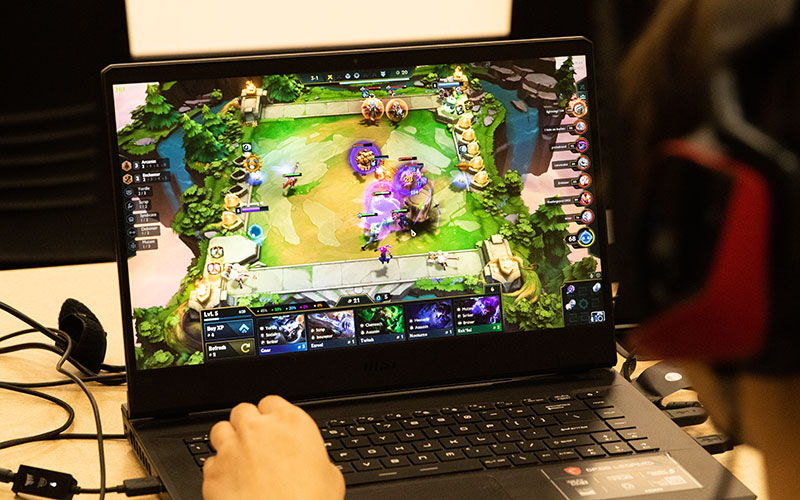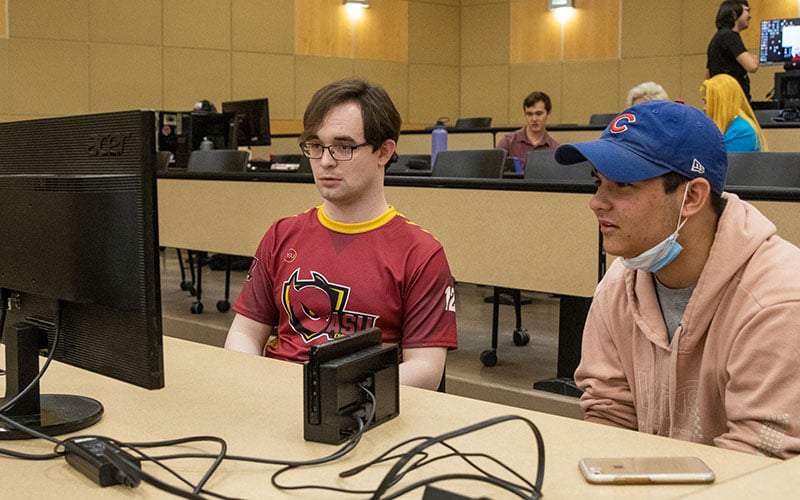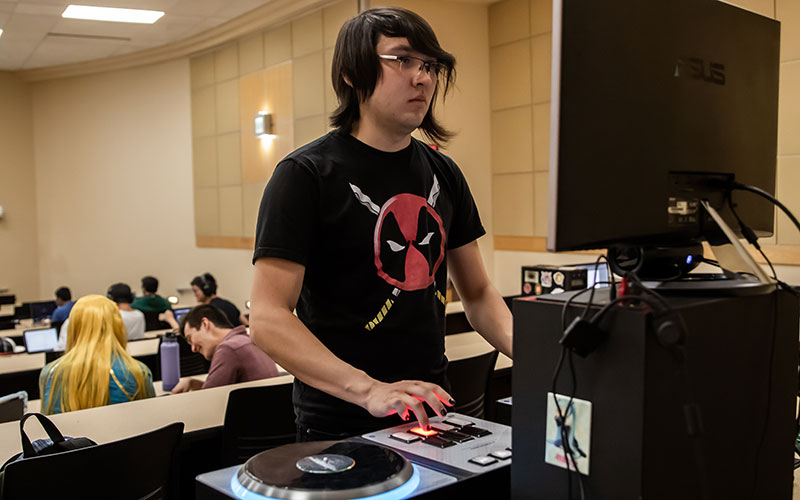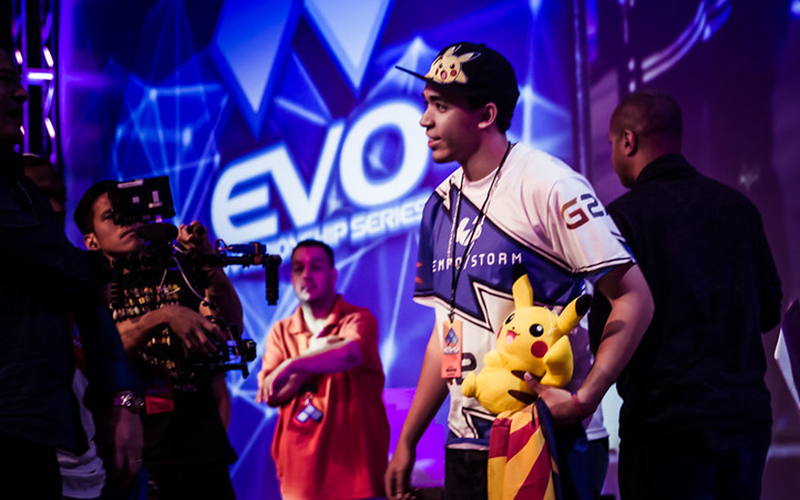
Teamfight Tactics is an autobattler published by Riot Games that has the League of Legends roster battle in strategic, free-for-all matches. (Photo by Xavier Johnson/Cronkite News)

ASU Esports Fighting Game Coordinator Adam Chismar, left, battles Chaz Cuarto in Super Smash Brothers Ultimate, a fighting game on the Nintendo Switch. (Photo by Xavier Johnson/Cronkite News)
TEMPE – From the fighting game community to rhythm gaming enthusiasts, ASU Esports has become a North Star for finding both competitive or casual like-minded gamers.
The appeal of gaming for many lies heavily in the social aspect of the activity. While the infrastructure exists for seamless online gaming, there’s still a draw for gamers to meet in person and play in person in what are historically called “LAN parties.”
ASU Esports, one of the largest student-run esports clubs in the country, held its first LAN of the semester on Friday, five months after the last LAN in November. With the lifting of mask mandates on campus, ASU Esports found an opportunity to run an event to bring its community that’s largely been online-only for the past two years, back together in Tempe.
Back in the day, the only way to play was in person. Participants would bring their setups and connect to the same hardwire internet connection. Not only did this allow for social gaming, but wired connections greatly reduced lag, making for a better competitive experience.
Even though playing online is now popular, modern-day LANs are still a crucial part of esports, with major college and professional finals ideally played in a LAN environment to minimize variables. ASU Esports’ “Rainbow Six: Siege” team – named for the game it played – had a LAN show match with GCU in the school’s esports arena..
ASU Esports President Claire Kenison said holding the first LAN of the semester was an exhausting, but fulfilling, experience that shows the value of in-person meetings for the community. For her, it’s rewarding to meet people that she’s interacted with on a daily basis through Discord.
“We need to remember that there is a face behind the keyboard,” Kenison said. “It helps keep the community engaged and you can make friends and find people to actually hang out with.”
The main hook for March’s LAN was a “Teamfight Tactics” tournament. The autobattler published by Riot Games is a popular game among the community and is something that players can run on pretty much any device.
It’s a mixed bag when it comes to people’s setups at LAN. Some only came with their phones capable of playing “Teamfight Tactics”; others came packed with their laptops or Nintendo Switch consoles. A select group don’t care about portability by bringing their PC and monitor to the event, often acting as gathering points for different groups.
The winner of the “Teamfight Tactics” tournament was Biomedical Engineering major Francis Lim. He won an ASU League jersey and $25 dollars worth of RP, an in-game currency that can be used to buy cosmetics in “League of Legends” and “Teamfight Tactics.”
“This feels validating for how much I’ve played the game,” Lim said.
He has consistently hit Masters rank in “Teamfight Tactics”, which places him within the top one percent of players in the region.
Others chose not to participate in the tournament, instead opting to play other – primarily, fighting – games. ASU Esports Fighting Game Coordinator Adam Chismar organized a “Super Smash Brothers” tournament the week before and ran some sets with others at the LAN.
The fighting game community has a deep connection with LANs. While most communities trace their origins to online gaming, the FGC was born in arcades and is built on in-person events, which are particularly popular among players of the fighting games who had unsatisfying online experiences..

Hunter White plays Beatmania IIDX on his personal setup at the ASU Esports LAN meetup. (Photo by Xavier Johnson/Cronkite News)
“Since the beginning, fighting games have always been this in-person, chatting up friends, trash talk sort of community,” Chismar said. “When you lose that aspect you’re really only looking at the text or voice call, you can’t see the person. We still play the games, but it’s not the same. So, being back is just really a great thing.”
A handful of players were there to play Smash and “Guilty Gear: Strive”, two of the biggest fighting games played on campus. There are more frequent fighting game meetups on campus, with players setting up in Memorial Union to play Smash. The next major tournament for “Guilty Gear” and Smash is on April 1, organized by Chismar.
The sole rhythm gamer, Hunter White, held it down for the small but dedicated rhythm gaming community at ASU. Boasting an impressive-looking PC and gaming setup, White hammered away at lightning-fast speeds in “Beatmania IIDX,” a game published by Konami, the creators of “Dance Dance Revolution.”
Rhythm games are a tight-knit niche in the gaming community that are some of the last representatives of the dedicated arcade grinders of yesteryear. Hunter travels to Tucson to play the game at an arcade, but has his own setup that he frequently brings to LAN. Typically, there’s a group in the back playing rhythm games from “Beatmania” to “Beat Saber,” but this time it was just him.
This LAN wasn’t as well attended as the last one in November, which Chismar attributed to students still testing the waters of attending in-person events as COVID-19 restrictions are loosening. The trend is mirrored in weekly Smash meetups.
“We used to get somewhere around 70 to 100 people a week,” Chismar said. “Now we’re looking more around 30 to 40 a week, so it’s been a big hit for us.”
Kenison said ASU Esports is scheduled to have one more LAN in April. She said it would be interesting to also have a field day, where the club members can trade their mouse and keyboard for a ball for an evening.

